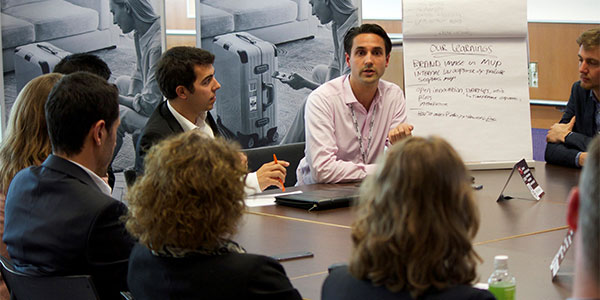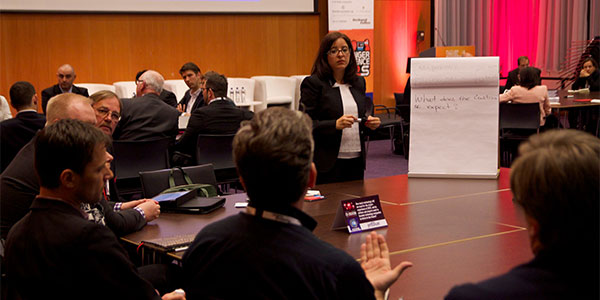
At Future Travel Experience Europe 2016 in Amsterdam, hundreds of the most pioneering passenger experience-focused minds came together to share their plans and visions for the end-to-end travel experience of 2025. While the opportunities created by technological advancements present a cause for optimism, during the two-day event it became increasingly clear that airlines, airports and their fellow air travel industry stakeholders must overcome some huge obstacles if the passenger experience is to dramatically improve over the course of the next decade. As part of FTE’s strategy to drive positive industry change, here we highlight five of the key conclusions from the event and suggest potential ways forward.
“Innovation” has become a throwaway word in the passenger experience field in recent times. When an airline or airport talks about “innovation”, they often mean they have introduced a simple new product or service that most of their competitors already offer. There are some exceptions, of course; the likes of Air France-KLM, Transavia and Gatwick Airport highlighted in the conferences how they are undertaking genuinely innovative projects to improve the customer experience and drive operational efficiency. Unfortunately, such examples are rare.
At FTE Europe, particularly during the Co-creation Forum, the focus turned to not just talking about innovation but actually achieving it. A question that is sometimes overlooked is why do companies actually need to innovate? What are the benefits? In the words of the late Steve Jobs, co-founder of Apple: “Innovation distinguishes between a leader and a follower.” In a rapidly changing world, and with ever evolving consumer demands, innovation and creativity are necessary in order to compete, or even survive, especially in an industry as competitive and saturated as the air transport sector.
1. Foster an innovation culture
Interestingly, one point cropped up in a number of the working groups in Amsterdam: true innovation requires a change in mindset and culture. Virgin Atlantic’s Debbie Hulme, Vice President of Customer Experience, spoke of the need to “foster an innovation culture”; Transavia Manager Marketing & Customer Strategies Daan Noordeloos said you must “bring it (passenger experience innovation) into the culture of an organisation”; and a feeling emerged in many of the Co-creation Forum working groups that airlines, and airports for that matter, could learn a lot from the latest generation of startups, who embrace a “yes and” rather than a “we could, but” mindset.
Some airlines clearly understand the need for a change in approach and culture. The likes of SAS and Lufthansa, and even low-cost carriers such as Transavia, JetBlue, Wow Air and Ryanair, already have their own dedicated innovation labs. There is a feeling that large corporate organisations often hinder innovation, whereas startup-style labs, which are willing to try something different and fail fast if necessary, foster a pioneering spirit. This approach can also be financially beneficial, again as highlighted during the Co-creation Forum. A lean startup approach is generally an iterative approach, which rarely requires significant investment on Day 1. The risk of investment for each next step in any development is actually lower than for traditional “waterfall approach” projects, in which you invest a large amount of money, work on a project for a long time, go to market and then discover that the customer needs or market dynamics have changed.
2. Everyone (especially airlines) should embrace data sharing
A change in mindset and culture is clearly necessary for many airlines and airports, but what is equally clear is that this industry cannot achieve dramatic and positive change by continuing to work in silos. It seems that everyone appreciates the need to get better at sharing data for the benefit of the passenger, but few are willing to do anything about it.
It is interesting to note, and almost certainly not a coincidence, that not a single airline decided to take part in the “data sharing” co-creation working group; all of the airlines in attendance opted to tackle one of the other eight topics instead. And this is one of the problems – there seems to be a desire among airports to facilitate improved data sharing, but this will isn’t reciprocated among airlines. Patrice About, Air France-KLM’s Director Ground Innovation, hinted at a concern among airlines that when data has been shared it has been abused by airports, so clearly there is work to be done to find a data sharing best practice. It is vital, though, that airlines do not become more insular because of past experiences.
Clearly, a lack of will is not the only issue; a lack of a guided approach to data sharing is a problem and needs to be addressed quickly. Some FTE Europe attendees have called for Future Travel Experience to take a lead on defining an A-CDM framework for terminal operations. We’re more than happy to contribute where appropriate, but surely established associations, the likes of ACI and IATA, should be addressing this issue head-on and striving to establish industry standards? Perhaps there is also an opportunity here for the likes of APEX to take on a leadership role in this space. More effective sharing of data can bring about benefits in terms of customer experience and day-to-day operational efficiency, and it can help to optimise resources and reduce operating costs. All things considered, it is baffling that the industry continues to operate in silos and refuses to openly share data. Gatwick Airport has developed the Airport Community app (more on this next week) to provide all airport stakeholders with a vast pool of real-time and relevant data, but this example is unfortunately an exception rather than the norm.
3. Accept that nobody owns the customer

This leads on to another important point raised at FTE Europe. Data sharing remains a contentious issue because too many air transport industry stakeholders are too keen to protect their own interests. Sharing data is seen as sharing power, and in an industry as fiercely competitive as this not many are willing to give up control. The irony here is that so many of those unwilling to share data don’t know how to make use of the data that they have access to. In an age in which passengers will pledge loyalty to those that make the best use of the information available in order to deliver a personalised passenger experience, those that continue to operate in silos will be the ones that fall short.
In the words of Vincent Thamm, Innovation Manager at Transavia: “I think we all see value in a total customer journey approach, involving all partners that have a role in your ecosystem. Open up your innovation activities to share data and co-innovate, and see a great customer experience as a joint responsibility.”
Concerns were also raised that third parties – the likes of Google and Facebook, for instance – pose a risk to airlines and airports, many of which retain a seemingly innate desire to “own” the passenger experience. The recent leak of Google’s plans to launch its own “Trips” app – a digital travel assistant that will allow users to keep track of past and upcoming trips – may well have added to this feeling. However, this mindset is flawed. One of the key conclusions from a working group led by Liliana Petrova, JetBlue’s Director Customer Experience Programs, concluded: “In 2025 nobody owns the customer. The airlines and airports are a service.” This feeds into Thamm’s earlier point that all stakeholders need to view the customer experience as a joint responsibility. The best way for airlines, airports, ground handlers and all other stakeholders to prove that they believe in this approach is to start sharing data for the benefit of their common customer, the passenger. Given the digital landscape, it was suggested by many at FTE Europe that airlines are now constantly in beta, as they search for new ways to make digital-led improvements. As airlines continue to struggle to come to terms with the rapid pace of digital transformation, turning your back on the biggest players in the digital world is surely not part of a recipe for success. Furthermore, if the likes of Google and Facebook are seen as the modern competition to airlines, ignoring what they can bring to the table is an irrational approach.
4. Share the risk, share the reward
Taking joint responsibility also means being open to sharing risk. Any truly innovative project carries an element of risk; after all, you are trying something that no one else has attempted. In a session focusing on cabin design led by Cristian Sutter, Cabin Design & Development Specialist for B787 and A350 Programmes and Siego de Sitter, Director Programmes, B/E Aerospace, one of the conclusions was: “Are suppliers willing to work together and collaborate with airlines? They are indeed, however the current model doesn’t involve risk sharing. Many innovations are not taken further due to the risk of commercial failure that is not shared between suppliers and airlines…Collaboration and co-creation can be further developed but only if risk sharing is agreed from the outset.”
What the industry must remember is when a passenger looks at their end-to-end travel experience, they don’t think about which elements the airline, airport, ground handler or any other player is responsible for; they view everything as a single experience. Unless all stakeholders involved, from airlines and airports to the associations that exist to serve the interests of their members, make an active effort to work more closely together, share data more effectively, accept that risk sharing is often necessary and take joint responsibility for the broader passenger experience, widespread positive change remains nothing more than a pipe dream.
5. Act now, not later
The fact that everyone is talking about embracing innovation to improve the passenger experience is a positive sign, but the time has arrived to put these good intentions into action. This industry has been paying lip service to words like “innovation” and “collaboration” for a long time, but now we must think about the bigger picture. Passengers are no longer willing to wait in long queues and put up with bland, disjointed experiences. They know that a better alternative is possible and they will pledge loyalty to those that offer them a experience that meets their exacting needs.
If all stakeholders can make a pledge to put personal interests to one side in order to work for the greater good, not only will passengers benefit, so will the very airlines, airports and other players responsible for delivering a seamless, memorable and even enjoyable travel experience. Everyone in the industry has been talking a good game, but now is the time for action, not words.






